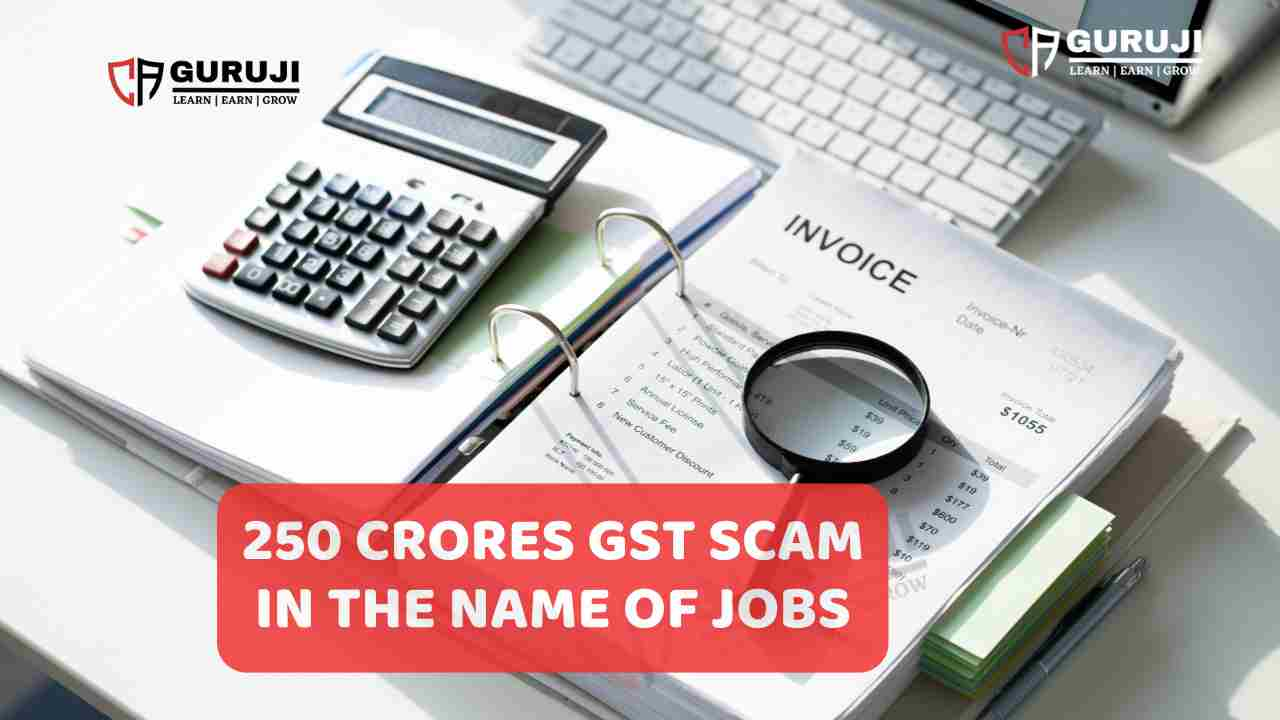In a shocking incident from Muzaffarnagar, Uttar Pradesh, Ashwani Kumar, a young unemployed man, found himself at the center of a Rs. 250 crore Goods and Services Tax (GST) fraud. Unbeknownst to him, a firm was being run in his name, issuing fraudulent e-way bills to evade taxes.
How the Fraud Unfolded
Ashwani Kumar, a resident of Barsu village, was like many other young men seeking employment. He received a WhatsApp call promising him a job opportunity. The fraudsters, posing as potential employers, asked for key documents, including his Aadhaar card, an electricity bill, and Rs. 1,750 to finalize his application. Eager to secure a job, Ashwani complied, unknowingly setting the stage for a major fraud to unfold.
Days passed, and he received no further communication regarding the job. However, his life took a sudden turn when a team from the GST department arrived at his home. The officials informed him that a firm registered under his name and address had issued fake e-way bills amounting to Rs. 250 crore.
The Modus Operandi
The fraudulent scheme targeted vulnerable individuals, especially the unemployed, who were lured with promises of jobs. Fraudsters, after obtaining personal documents, would register companies in the names of these unsuspecting individuals. These companies would then be used to issue fake e-way bills, allowing the fraudsters to evade GST.
In Ashwani’s case, the GST team confirmed that he was merely a victim and had no knowledge of the transactions being carried out in his name. A police complaint has been lodged, and further investigations are ongoing.
Ashwani Kumar’s Statement
Speaking about his ordeal, Ashwani Kumar said, “I got a job offer a few days ago, and they requested documents like my father’s Aadhaar card and our electricity bill. They also asked for Rs. 1,750, which I transferred. The GST officials informed me that a company is operating under my name and that numerous transactions have occurred. A police complaint has been filed, and officials have taken down the information.”
Investigation Underway
Aditya Bansal, Superintendent of Police in Muzaffarnagar (Rural), stated, “It appears that Mr. Kumar was duped after being promised a job, and an e-way billing fraud was committed. We are in contact with the GST department, and further inquiry is underway.”
The GST department’s initial investigation revealed that the fraudsters not only registered companies in the names of unsuspecting individuals like Ashwani Kumar but also used their addresses to file fake e-way bills. These bills, typically meant to track the movement of goods and services, were manipulated to show transactions worth crores, thus avoiding taxes.
Bigger Nexus Uncovered: The Role of Junk Dealers and Rickshaw Pullers
In a parallel investigation, the Income Tax Department, Kanpur division, uncovered a larger nexus in the Bhusa Toli area, known for its junk market. Here, the mastermind of the fraud had registered companies in the names of junk pickers and rickshaw pullers, who had no idea that they were being used in such a large-scale scam.
The accused had opened multiple bank accounts using fake addresses and collected signatures, cheque books, and ATM cards from the individuals by promising them a monthly payment of Rs. 10,000. These accounts were used for transactions worth over Rs. 250 crore, while the actual beneficiaries withdrew the money through cheques.
A Growing Concern
This is not an isolated incident, as similar cases of fraud involving fake companies and tax evasion have been reported across the country. Fraudsters are increasingly targeting the unemployed and economically vulnerable individuals, leveraging their desperation for employment to carry out illegal activities.
These scams not only result in financial losses for the government but also tarnish the lives of innocent people who become unwitting participants in such schemes.
Response from Authorities
A senior Income Tax official confirmed that they are investigating the involvement of banks in allowing the opening of accounts without proper background checks. The Reserve Bank of India (RBI) is also being notified to strengthen its regulatory framework.
The officials emphasized the need for public awareness to prevent similar incidents. The unemployed and economically vulnerable individuals are often the prime targets for such scams. Government authorities are urging individuals to be cautious about sharing personal details and to verify the authenticity of job offers.
How to Safeguard Against GST and Employment-Related Frauds
The alarming case of Ashwani Kumar highlights the growing risks associated with identity theft and fraudulent activities, especially in the context of GST fraud. Fraudsters are increasingly exploiting vulnerable individuals, particularly those seeking jobs, to commit large-scale financial fraud. Here are some practical steps individuals can take to safeguard themselves from falling prey to such schemes:
1. Verify Job Offers Thoroughly
- Cross-Check the Source: If you receive a job offer via phone, email, or social media, always verify the authenticity of the employer. Look for the company’s official website, contact information, and job postings on legitimate job portals.
- Avoid Unofficial Communication: Fraudsters often use informal communication channels like WhatsApp or Telegram to offer jobs. A legitimate employer will typically communicate through official channels like email and will not ask for personal documents upfront.
- Research the Company: Before sharing any personal information, research the company online. If it’s a legitimate company, you should be able to find its business registration, contact details, and reviews from other employees or applicants.
2. Be Cautious with Personal Documents
- Limit Sharing of Sensitive Documents: Do not share your Aadhaar card, PAN card, electricity bill, or other personal documents without thoroughly verifying the authenticity of the party requesting them.
- Check the Purpose of Document Submission: Legitimate employers will never ask for documents like electricity bills for job applications. Be wary of unusual document requests that don’t align with the hiring process.
- Secure Your Documents: Consider masking or watermarking sensitive documents before sharing them electronically. Watermarks can include phrases like “For Job Application Only” to prevent misuse.
3. Avoid Paying for Job Offers
- No Genuine Employer Asks for Money: If an offer requires payment upfront for processing fees, application submission, or securing a position, it’s likely a scam. A legitimate employer will never ask for money in exchange for a job offer.
- Report Requests for Payment: If you encounter job offers asking for money, report them to appropriate authorities, such as local law enforcement or online platforms like the Cyber Crime Reporting Portal.
4. Be Aware of Fake Company Registrations
- Monitor Your Financial and Tax Records: Regularly check your bank accounts, GST registration status (if applicable), and tax records for any unusual activities. If you find any company registered in your name or suspicious financial transactions, report it immediately.
- Register for Alerts: You can register for alerts with the GST portal and other tax authorities. This will notify you if any activity is conducted in your name without your knowledge.
5. Educate Yourself About Fraud Prevention
- Know the Red Flags: Be aware of the warning signs of a job-related or financial scam. These include:
- Unsolicited job offers without interviews.
- Requests for money, especially small amounts, to secure a position.
- Demands for sensitive documents early in the application process.
- Follow Government Guidelines: Stay updated on guidelines and advisories issued by the GST and Income Tax departments, which regularly release information on common scams and how to avoid them.
6. Use Strong Digital Security Practices
- Secure Your Devices: Ensure your devices are protected with up-to-date antivirus software, and avoid downloading or accessing links from unknown sources.
- Strong Passwords: Use strong and unique passwords for all your accounts and enable two-factor authentication where possible. This will reduce the chances of unauthorized access to your personal information.
7. Report Suspicious Activity
- File Complaints Promptly: If you suspect that your identity has been used fraudulently, report it immediately to both local law enforcement and the GST or Income Tax department. Prompt action can prevent further misuse of your details.
- Reach Out to Cybercrime Units: India’s Cyber Crime Reporting Portal and local cybercrime units are key resources for reporting scams and seeking redressal.
The unfortunate case of Ashwani Kumar illustrates how easily fraudsters can manipulate personal information to execute large-scale financial fraud. By staying vigilant, verifying job offers, limiting the sharing of personal details, and reporting suspicious activities, individuals can protect themselves from becoming victims of such scams. It is essential to stay informed, exercise caution, and follow best practices to safeguard personal information from misuse.
Government authorities are also working to tighten regulations and ensure that fraudsters are brought to justice. However, public awareness and individual caution remain key in preventing these scams from succeeding.
Visit www.cagurujiclasses.com for practical courses











